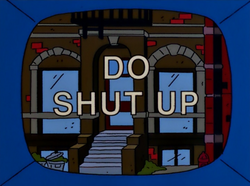
Difference between revisions of "Do Shut Up"
(→Behind the Laughter) |
Snowball II (talk | contribs) |
||
| Line 7: | Line 7: | ||
}} | }} | ||
| − | '''''Do Shut Up''''' is [[England]]'s most popular sitcom. | + | '''''Do Shut Up''''' is [[England]]'s most popular sitcom. [[PBS]] rebroadcasts it in the [[United States]]. |
== History == | == History == | ||
Latest revision as of 23:12, May 5, 2024
Do Shut Up
| ||||||
TV Show Information
|
Do Shut Up is England's most popular sitcom. PBS rebroadcasts it in the United States.
History[edit]
Homer Simpson is a big fan of Do Shut Up. The show is about a hard-drinking-yet-loving family of soccer hooligans. According to Homer's description, "If they're not having a go with a bird, they're having a row with a wanker." Homer enjoyed watching the show, but got frustrated when it was interrupted for a PBS pledge drive hosted by Betty White. In order to get the network to resume showing the program, Homer made an anonymous $10,000 pledge. He got into trouble with PBS, however, when the network's Pledge Enforcement Team tracked him down and confronted him at home in order to make him fulfill the pledge. The team made Homer go to his bank to withdraw the money for the pledge, but Homer was forced to admit that he didn't have $10,000 and had made a fake pledge. At this, Betty White sicced a mob of PBS characters on him, among them the hooligans from Do Shut Up.
Do Shut Up is produced by Thames Television. The show is billed as England's longest-running series, with a total of seven episodes.
Behind the Laughter[edit]
Do Shut Up being billed as England's longest-running sitcom in spite of having only seven episodes is a tongue-in-cheek reference to the tendency for British sitcoms to have what American audiences would consider to be very short broadcast runs, in terms of the number of episodes aired. For example, the hotel sitcom Fawlty Towers, which has been successful in the USA as well as the UK, had a broadcast run of only twelve episodes.
The show is a parody of the slapstick-oriented British sitcoms that were popular in the late 80's and 90's in the UK, such as Bottom.
Before the show begins it shows the Thames TV title card, which was shown before every show made by the company, in particular those that were made in association with the broadcast company ITV, such as Mr. Bean and Dangermouse, both shows that were popular imports to the US.

